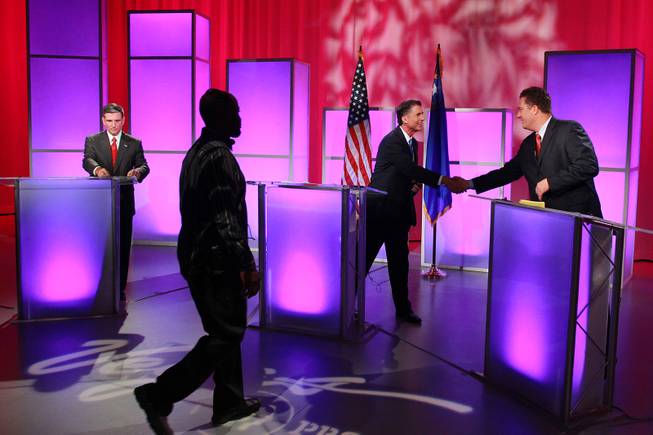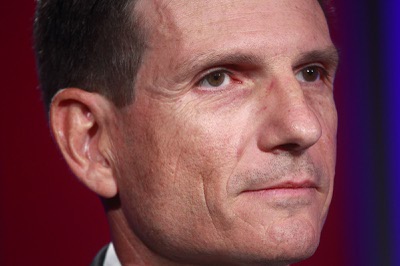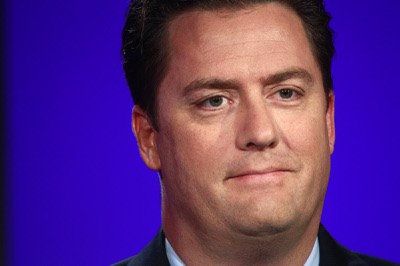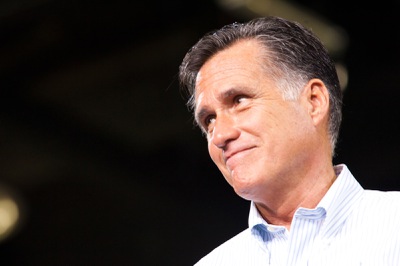
Sam Morris / Las Vegas Sun
Third Congressional District candidates Dr. Joe Heck, left, wraps up while moderator Mitch Fox shakes John Oceguera’s hand after a debate at Vegas PBS Thursday, Oct. 11, 2012. Photography was not permitted during the debate.
Monday, Oct. 15, 2012 | 2 a.m.
Sun Archives
- In two testy debates, clear contrasts between congressional hopefuls (Oct. 11, 2012)
- Joe Heck defeats Dina Titus in 3rd District House race (Nov. 3, 2010)
- Oceguera set to launch Spanish-language ad campaign (Oct. 2, 2012)
- More political stories
Nevada’s 3rd Congressional District may now be a decade old, but as this year’s race for the seat proves, the district still is gripped by an identity crisis.
The 3rd has always been a swing district, for good reason. It’s urban and it’s rural. It’s rich and it’s poor. And according to the registration numbers, it has an almost dead-even split between Democrats and Republicans.
The culture of opposites has kept voters from sticking with any single political persona to represent them in Washington. And this election season, the men up for the job are about as stylistically different as candidates get.
Defending the seat is Republican incumbent Joe Heck, the wiry doctor with a formal manner that reflects his military background and an encyclopedic speaking style that recalls the years he spent in classrooms memorizing medical terminology.
Challenging him is Democrat John Oceguera, the comparatively corporeal fireman who talks about politics through personal anecdotes, often ambling (and sometimes stumbling) his way through unscripted speaking engagements.
Both are making a play for the center. Each has worked to portray himself as the one with common sense and his opponent as a radical extremist.
Take health care. After a false start this spring, Oceguera has said he supports the health care law nicknamed “Obamacare,” after President Barack Obama, and its individual mandate that everyone carry health insurance. He’s also been bashing Heck for his votes to repeal Obamacare and restructure Medicare in the manner proposed by vice presidential candidate Paul Ryan, which Democrats charge would cripple the program.
Heck defends himself against the charges by arguing that he has worked to replace the health care law he’s voted against so often with new legislation, such as a bipartisan bill he introduced on Medicare reimbursement rates. None of his efforts, however, has come close to the comprehensiveness of the 2010 Affordable Care Act.
“Part the issue is, I'm not going to repeal a 2,700-page bill and replace it with a 2,700-page bill,” Heck said in an interview. “The goal is not to put a bunch of bad and good provisions in the bill, it’s 'let’s talk about these things in individual terms.'”
As for the health insurance program for senior citizens, Heck says “we’re not jeopardizing the quality of Medicare.”
“In the current proposal that has been put forward, the traditional Medicare is just as it is today,” Heck said in an interview. “It goes back to giving seniors choice.”
Democrats up and down the ticket dispute the math behind that conclusion, pointing out that winnowing the traditional Medicare pool down to only poorer seniors — who likely couldn’t afford preventive health services or lifestyle choices before they went on Medicare — will raise costs and lower quality.
National polls show voters generally trust Democrats more than Republicans to handle Medicare policy. But in the 3rd District, Heck is beating Oceguera on that question 49 percent to 36 percent, according to a September Las Vegas Review-Journal poll.
Heck, meanwhile, has been going after Oceguera for supporting tax hikes, specifically the Democratic proposal to raise tax rates on the top income earners to 1990s levels at the end of the year. Heck contends that is a recipe for killing jobs.
Oceguera does support the party’s “Buffett rule” position that millionaires and billionaires should be required to pay at least a 30 percent effective tax rate. But Oceguera says protecting middle-class tax deductions is better for spurring job growth than allowing the wealthy a tax cut.
“We've got to stop subsidizing corporations that are shipping jobs overseas ... so let’s incentivize them to bring those jobs back home, by giving a tax break of 20 percent of the costs associated with (that),” Oceguera said. “I’ve proposed a tax credit for products that are made in America. ... We could double the small business start-up tax credit ... and have a simplified home office tax deduction that everybody could use to support our small businesses.”
Oceguera has also proposed tax cuts for businesses that partner with universities as a way to bolster an educated workforce.
He calls himself “a big advocate of investing in early childhood education” and making college more affordable.
“My opponent voted on the Ryan budget to reduce Pell grants,” Oceguera said. “My mom went to school on a Pell grant; I went to school on a Pell grant. ... I know folks can’t afford college without one.”
For more
But Heck acknowledged he voted to return Pell grants to pre-stimulus levels but said he’s trying to free up more money for schools to spend as they see fit.
“Only about 10 percent of the school district budgets comes from the federal government, but there are so many strings attached that they can’t use it to their best effectiveness,” Heck said. “We’re giving them the money. Why not give them some flexibility?”
Those three issues — health care, taxes, and education — have largely dominated the bickering in the Heck-Oceguera campaign. That is perhaps because in other areas, they share quite a bit of common ground.
On housing, there’s room for overlap.
Oceguera has charged that Heck, like presidential candidate Mitt Romney, advocates letting the housing market hit bottom. But that’s not exactly accurate. Heck has voted for almost every mortgage modification program the Obama administration has rolled out or needed reauthorized.
He does stop short, however, of backing principal reduction.
“If the goal is to be able to get a homeowner to be able to afford to stay in their home, the quickest and easiest way is through refinancing,” Heck said. “It’s about the monthly payment and them being able to stay in their homes, not about what the total amount of the loan is.”
Oceguera does support principal reduction. But he’s measured about how it should be implemented, and his goal sounds a lot like Heck’s.
“I think we have to be looking at principal reduction, but everybody's got to have some skin in that game,” Oceguera said, emphasizing that the most important thing to stabilize the housing market is that underwater homeowners “not have to sell that house on foreclosure.”
“Every house on my street besides mine has either been foreclosed on, short-saled or someone's walked away,” Oceguera said, saying that he wanted to introduce a federal mediation program between banks and underwater homeowners that ensure “the homeowner gets to stay in the home.”
On energy, there’s little daylight between the candidates once you get past their squabble about whether to end oil and gas subsidies. Oceguera says yes, Heck votes no.
When it comes to Nevada’s burgeoning renewable energy market, “I think there's some public-private partnerships that can happen,” Oceguera said, adding he’s in favor of opening public lands, expanding tax credits and supporting loan guarantees if it would help with building infrastructure.
“I think it's an all-of-the-above strategy,” Oceguera said.
All of the above is Heck’s line, too.
Unlike most Republicans, he says he’s fine with the idea of more tax cuts and loan guarantees for renewable energy projects — just so long as the government does a better job of making sure they don’t hand over money to any more Solyndras.
“This administration has tried to pick winners and losers, and so far they've only picked the losers,” he said.
Heck isn’t exactly right on that. While three renewable energy projects with federal loan guarantees failed, 23 are still in business.
On foreign policy, the two candidates generally agree on the approach to one of today’s most imminent crises: Iran.
Heck and Oceguera both support fighting Iran’s ability to get a nuclear weapon, and support exhausting diplomacy and sanctions before turning to the military option.
Heck, however, says “we’re at that point,” while Oceguera seems less convinced. But they both say they would vote to back up those efforts with military threats — even to the point of a ground forces invasion.
“We have to be very careful that we don’t commit troops unnecessarily ... but the threat of military force should be there because it’s too big of a threat to the whole global community,” Oceguera said.
“I would not envision it requiring large numbers of boots on the ground,” Heck said. “I think we just have to make sure we have a credible threat and a red line that Iran clearly understands.”
Such overlap can often happen when two people from opposing parties are one-upping each other for the centrist spotlight.
To some extent, being politically successful in the 3rd District depends on the ability to stay relatively centrist. Republican Rep. Jon Porter, who logged three terms in the seat, voted with his party 85 percent of the time, according to a Washington Post study of voting records. Compare that with Democratic Rep. Dina Titus — she only kept the seat for one term, in which she voted with her party 97 percent of the time.
Heck, who has consistently polled ahead of Oceguera, has kept his party loyalty rate at the somewhat lower 89 percent.
No similar databases exist to judge Oceguera’s voting record in the Nevada Assembly. But over a 12-year career there, including a stint as speaker, he built a reputation as a conservative Democrat and centrist that he has sought to preserve on the campaign trail.
He angered his party’s more liberal wing by supporting education reforms the teachers union opposed, for example. He also maintained a strong NRA rating.
Oceguera has been playing up that record while he tries to paint Heck as an out-of-touch extremist, most recently through a series of commercials about how Heck voted against a rape crisis center while in the Nevada Senate.
It’s a charge Heck says is unfair, claiming that he “probably would have” voted to preserve the rape crisis center had it not been presented as part of a larded-up, omnibus spending package the majority tried to force through at the eleventh hour of the legislative session.
But, Heck admits with chagrin, the Republicans in Congress have used the same tactics.
He brought up a recent House vote to repeal the Independent Payment Advisory Board, or IPAB, a decision-making entity under the original health care law that most members of Congress agreed had to go.
“That was a bill that was bipartisan when it was introduced,” Heck said. “But unfortunately, when it came time to vote on the bill, another provision was put on it that lost Democratic support — and that’s why the Senate didn’t take it up.
“Instead of concentrating on our differences, we've got to concentrate on our similarities,” Heck said. “When we agree on things, we need to move those forward.”







Join the Discussion:
Check this out for a full explanation of our conversion to the LiveFyre commenting system and instructions on how to sign up for an account.
Full comments policy